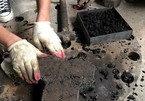Nhan, who attended the seminar themed ‘Declaring war on plastic waste’ organized by the government e-information portal on November 14, said Vietnam is pursuing the principle that economic development must be associated with environmental protection.

The government has laid down a legal framework to accelerate the collection, classification and recycling of waste, striving for a circular economy in Vietnam.
Like many other countries, Vietnam is facing big challenges from environmental pollution and climate change. Solid waste and plastic waste are at an alarming level.
It is estimated that each household in Vietnam uses 5-7 plastic bags a day. Plastic bags are popular because they are very cheap and convenient.
| The current tax rate on plastic bags is VND50,000 per kilogram, which, according to Deputy Minister of Natural Resources and the Environment Vo Tuan Nhan, is "not high enough". |
About 1.8 million tons of plastic is discharged into the environment, but only 27 percent can be recycled. Vietnam is also facing the risk of becoming a global dumping ground with the volume of plastic waste increasing by 200 percent last year. The plastics consumption per head increased from 3.8 kilograms to 41.3 kilograms in 1990-2018.
“If Vietnam cannot control the use of plastic bags, this will adversely affect sustainable development, and economic development won’t offset the damages caused by pollution,” he said.
Trinh Kim Chi from the Vietnam Association for Conservation of Nature and Environment (VACNE) also commented that there are still many problems in collecting, recycling and reusing plastic waste and disposable plastic bags in Vietnam. This not only brings harm to the environment, but also affects people’s health.
“In nature, plastic products last for several hundred years, and the existence harms soil and water. If plastic bags are treated with heat, the process produces toxic gases. And with the bad heat, this will produce dioxin, CO2 and other toxic substances harmful to the body,” Chi said.
Hanoi alones produces 5,000 tons of waste a day, of which 7-8 percent are plastic bags and other plastics. HCM City also discharges millions of plastic bags every day.
“The situation is alarming. If we do not see the impact of plastic bags on the environment, life and human health, not only our current generation but also the later generation will be affected,” said the expert.
Nhan believes that in order to restrict the use of plastic bags it is necessary to raise the environmental tax on plastic bags and offer tax remissions for manufacturers of environmentally friendly bags.
Thien Nhien

Vietnamese students make paving materials from plastic bags
Five students from the Hanoi-based Transport University have successfully produced a street paving material from plastic bags.

Hanoi to battle plastic waste
Hanoi authorities have issued a plan to prevent and limit the use of plastic bags to 2020, with a view to 2025.
 The current tax rate on plastic bags is VND50,000 per kilogram, which, according to Deputy Minister of Natural Resources and the Environment Vo Tuan Nhan, is "not high enough".
The current tax rate on plastic bags is VND50,000 per kilogram, which, according to Deputy Minister of Natural Resources and the Environment Vo Tuan Nhan, is "not high enough".